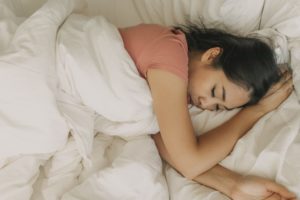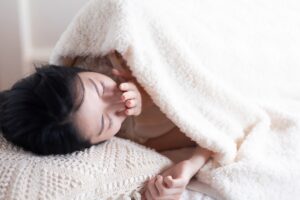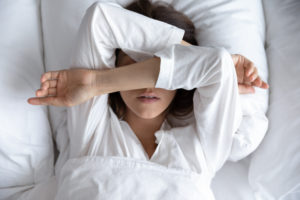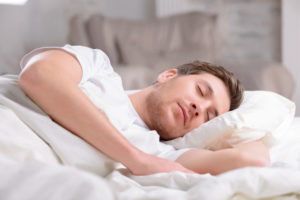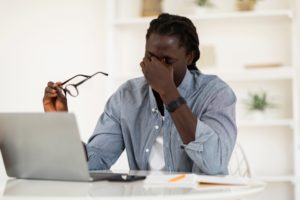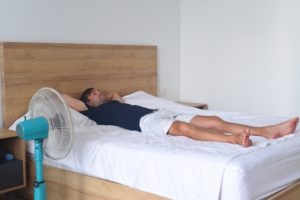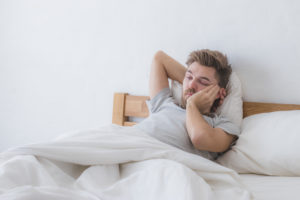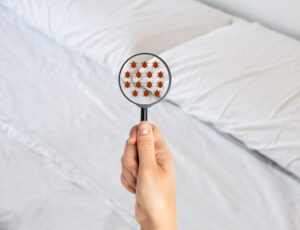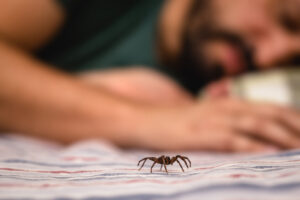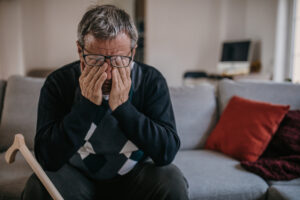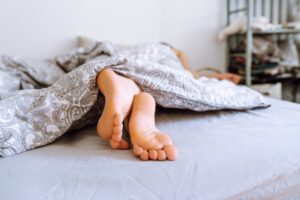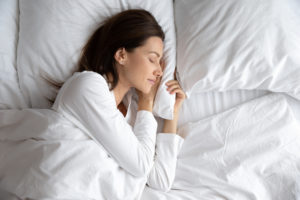When you buy through our links, we may earn a commission. Products or services may be offered by an affiliated entity. Learn more.
How to Sleep With a Sunburn
A sunburn is an inflammation and painful discoloration of the skin caused by radiation damage from excess time in the sun. Discomfort from a sunburn may especially flare up at night. While sunburn treatment doesn’t heal your skin, it can ease pain and swelling. We cover practical steps to reduce this pain and make it easier to get quality sleep after a sunburn.
Use Cold Water
Taking a cool shower, bath or applying cold compresses with a washcloth can provide relief to the burning sensation of damaged skin. Taking these steps before bed may make it easier to get comfortable and fall asleep with a sunburn.
“Cool water can reduce blood flow to the skin, which can help decrease inflammation and improve comfort.”
Dr. Lulu Guo, Sleep Physician
Looking to improve your sleep? Try upgrading your mattress.
Apply Appropriate Creams
Certain creams and ointments can decrease discomfort from a sunburn, but it is important to avoid the wrong types of products.
A cream may soothe pain and can be used if there is no blistering around a sunburn. Aloe vera and creams with vitamin C or E may also be helpful. Some people also get relief from hydrocortisone creams, but research about their benefits is limited. It is also important to consult your doctor on the length of steroid cream use as prolonged application can cause thinning of the skin.
Some creams and other products can cause adverse reactions and should be avoided. These include :
- Oil-based balms or creams
- Petroleum jelly
- Creams with lidocaine or benzocaine
- Butter
- Heavily scented products
Wear Non-Irritating Clothing
To be more comfortable when going to bed, wear loose clothing to prevent excess pressure against sunburned skin. Seek out materials that are light, breathable and soft, such as cotton or silk.
Consider Pain Medications
Some over-the-counter medications can reduce pain from a sunburn. Before going to sleep, you can consider taking ibuprofen or tylenol. A pharmacist or doctor can answer questions about the safety and appropriate dose of these medications. Sometimes a prescription medication can be given by your doctor if the sunburn is severe.
Stay Hydrated
Along with a sunburn, excess sun exposure can lead to dehydration, which can further dry out the skin. Drinking plenty of water can replenish fluids and prevent worsening effects of dehydration. It is important to avoid coffee, tea and alcohol which can further dehydrate your body. Adequate hydration also makes sure your body is able to send extra fluids to the sunburned areas and help with flushing out toxins and healing the skin.
Care for Blisters
Blisters don’t always show up right away after a sunburn. They may take hours or overnight to show up. If a sunburn blisters, try to keep it from breaking open, which can make it vulnerable to infection. Place a dry, lightweight bandage over blisters to add a layer of protection when lying in bed.
When a blister breaks, gently clean the area with mild soap and water and then apply a nonstick bandage over a thin layer of antibiotic ointment. A hydrocortisone cream may provide pain relief by decreasing inflammation.
Talk to a Doctor
Most sunburns do not require medical attention, but a doctor should be promptly consulted if severe symptoms arise, including:
- Burns over more than 15% of the skin
- Extreme pain or blistering
- Lightheadedness
- Very fast heartbeat
- Excessive thirst
- Lack of urination
- Fever or chills
- Nausea
- No response to at home treatments
Why Do Sunburns Get Worse at Night?
While sunburns do not necessarily get worse at night, people may become more aware of them in the evening. It usually takes four or more hours for sunburn symptoms to arise, so a sunburn may first be noticed at night.
In addition, pain from a sunburn generally worsens about six hours after a burn happens, which can mean intensifying pain when trying to go to sleep the night after getting a sunburn. Depending on where a sunburn is on the body, lying down at bedtime may also cause irritation.
Do Sunburns Make You Tired?
Fatigue or tiredness can occur after a sunburn, which may be related to overheating and dehydration from heavy sun exposure. When the body gets too hot, it has to use up resources, including fluids, to reduce its temperature. As a result, energy can be depleted and the body can become dehydrated, leading to more fatigue.
How to Prevent Sunburns
Because of the skin damage that sunburns cause, experts recommend precautions to prevent sunburns.
- Avoid intense sunlight: Sunburns are most likely when the sun is strongest, between 10 a.m. and 4 p.m. Snow and water can also reflect the sun’s rays and make it easier to develop a sunburn. This explains why it is easier to develop a sunburn while in water.
- Find shade: When outside during the day, seek out a shady spot where direct UV exposure is limited.
- Use quality sunscreen: Be vigilant about putting on plenty of sunscreen when going out in the sun. Use a broad-spectrum, SPF 50 sunscreen and reapply it frequently to make sure all exposed skin is protected. The most commonly missed areas to apply sunscreen are behind the ears, back of neck and exposed areas of the scalp. The lips can be sunburnt too, and applying a SPF lip balm is recommended.
- Wear protective clothing: Use clothing such as long sleeve shirts and pants to keep skin from being exposed to the sun. Some clothing is especially designed to block UV rays. A hat with a wide brim can keep sun off the face and neck.

Still have questions? Ask our community!
Join our Sleep Care Community — a trusted hub of sleep health professionals, product specialists, and people just like you. Whether you need expert sleep advice for your insomnia or you’re searching for the perfect mattress, we’ve got you covered. Get personalized guidance from the experts who know sleep best.
References
3 Sources
-
Young, A. & Tewari, A. (2023, September). Sunburn. In R. Dellavalle, D. Danzl, & R. Corona (Ed.). UpToDate., Retrieved September 21, 2023, from
https://www.uptodate.com/contents/sunburn -
A.D.A.M. Medical Encyclopedia. (2023, June 7). Sunburn. MedlinePlus., Retrieved September 23, 2023, from
https://medlineplus.gov/ency/article/003227.htm -
National Institute for Occupational Safety and Health. (2018, May 31). Sun exposure – sunburn. Centers for Disease Control and Prevention., Retrieved September 23, 2023, from
https://www.cdc.gov/niosh/topics/sunexposure/sunburn.html





